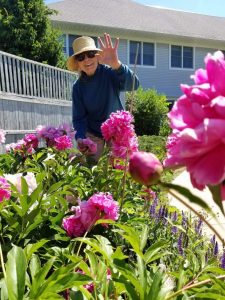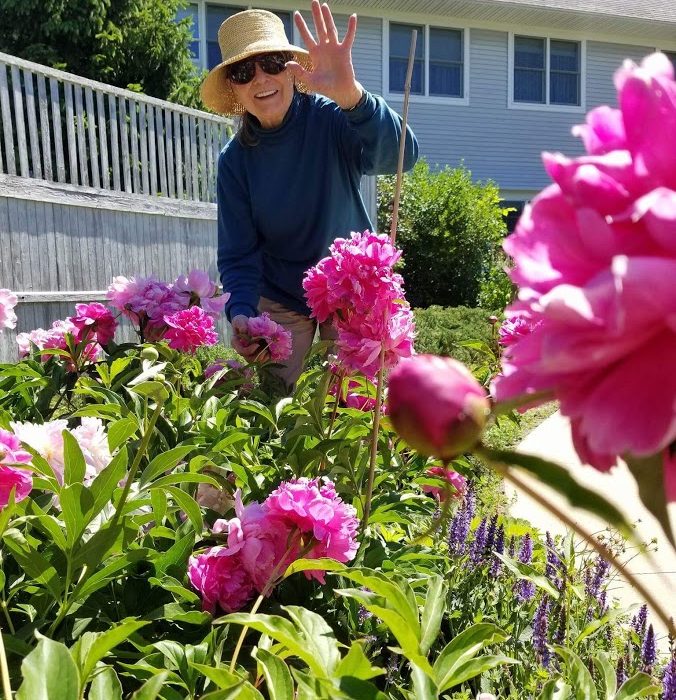Birch Bay’s innovative Alzheimer’s programs
By Anne Kozak
 BAR HARBOR—Since people thrive on doing what they enjoy and are good at, Birch Bay’s executive director Peter Sullivan has designed programs that allow residents with dementia to thrive. And the staff has been trained to focus on what residents of Safe Harbor and members of the Straus Center Adult Day Program want to do.
BAR HARBOR—Since people thrive on doing what they enjoy and are good at, Birch Bay’s executive director Peter Sullivan has designed programs that allow residents with dementia to thrive. And the staff has been trained to focus on what residents of Safe Harbor and members of the Straus Center Adult Day Program want to do.
“As long as it’s safe and manageable, we help then do what they want to do and are often good at doing,” said Sullivan. “It used to be that we tried to reorient people with dementia and pull them into our reality. This can be upsetting, so we try to engage them not confront them. This not only helps the residents bloom but often reduces the need for medication.”
That Sullivan’s approach works is evidenced by the Memory Garden—a garden of herbs, vegetables, flowers and shrubs planted, cared for and harvested by residents and enhanced by a trellis with grapes and raised beds made by residents. In mid-September, the garden had numerous tomato plants, sunflowers, asters, zinnias, goldenrod, blue hydrangeas, sedums and herbs as well as a resident ready to deadhead plants so that flowers would continue to bloom.
“Recently we have been eating lots of tomato sandwiches which the residents have made,” said marketing director Susanne Hopkins. The onions, garlic, herbs and flowers residents bring in spark memories, and they talk about how they or members of their family had used those plants, said Sullivan.
The raised beds which a former boat builder and a retired carpenter who restored furniture made are unlike most traditional raised bed. These are designed with an opening for a wheel chair and at a height that accommodates people standing or sitting in a wheel chair. This summer, the resident carpenters built vertical planters which can either hold potted plants or planted with herbs and strawberries. These men also built a garden table which was auctioned to raise funds for purchasing materials for similar and other projects. “They designed the table, chose the wood, cut, sanded and painted it and also selected the hardware,” said Sullivan. Hopkins documented the project and posted pictures of it on social media and Birch Bay’s website so that family and friends could see loved ones doing what they enjoyed.
Another feature of Birch Bay’s program is music and movement therapy. Music, said Sullivan, stimulates parts of the brain and enhances language skills for up to two hours. The combination of sensory experiences from hearing music or smelling plants increases the likelihood of engagement and enjoyment and thus enhances the quality of life.
This fall residents will pick apples and gather pumpkins. In addition to eating apples or making applesauce, residents will choose pumpkins to be carved and decide where in the larger Birch Bay village they will be placed.
Outside the door of each room in Safe Harbor is a shadow box in which residents put things like shells, chocolates, pictures, fishing lures or pieces of knitting. Residents, said Hopkins, not only enjoy making these but also help them identify their room when walking the halls or coming back from an activity.
To provide caregivers some respite, Birch Bay also has the Straus Adult Day Program. Like residents of Safe Harbor, members of this group participate in music and movement therapy, help with gardening, build tables, planters and trellises and participate in the life enrichment program—a program that allows them to pursue interests they enjoy.
Approximately 75 percent of those attending the Straus program receive funding from the Eastern Agency for the Aging for 20-30 hours a week, said Hopkins.
“Dad is much more independent, is more talkative and much happier. The best thing of all about Birch Bay Village is that I am able to go to work each day and be assured that my dear dad is receiving wonderful care and lots of love,” said the child of one member of the Straus Center.

